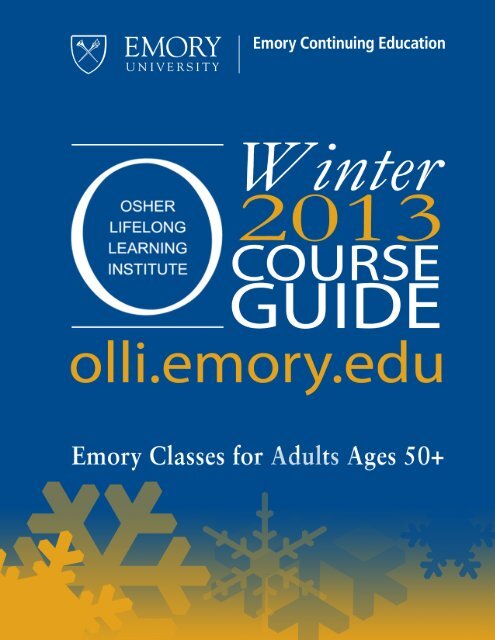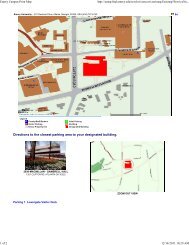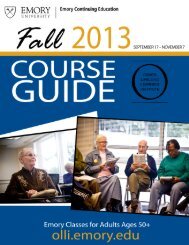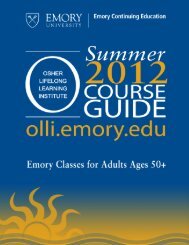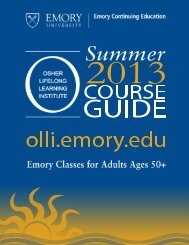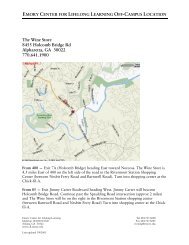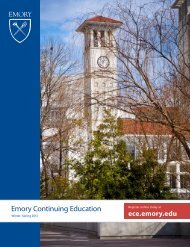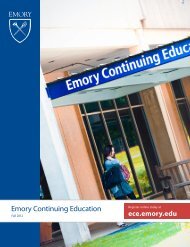tuesdays - Emory Continuing Education - Emory University
tuesdays - Emory Continuing Education - Emory University
tuesdays - Emory Continuing Education - Emory University
- No tags were found...
You also want an ePaper? Increase the reach of your titles
YUMPU automatically turns print PDFs into web optimized ePapers that Google loves.
Osher Lifelong Learning Institute (OLLI) at <strong>Emory</strong> is an educational adventure - the quality of instruction and group participationmakes OLLI at <strong>Emory</strong> an engaging intellectual and social experience. A $99 quarterly membership fee entitles you to enroll in up to4 OLLI classes of your choice. (Some courses have additional registration fees.) Or you may select a single class for a “sampler’s fee” of$69 (computer classes not included). Register today! Classes are held at <strong>Emory</strong> <strong>Continuing</strong> <strong>Education</strong>, 1256 Briarcliff Road, BuildingB. To register, call <strong>Emory</strong> <strong>Continuing</strong> <strong>Education</strong> at 404.727.6000 or visit olli.emory.edu. Open to all adults ages 50 and above.TUESDAYS:JANUARY 15-MARCH 510:00AM-11:00AMGet in Touch with Social MediaInstructor: Stephen BeehlerWe all know about social media. In this class, wewill discover how to use some of the most popularplatforms. Classes will include Facebook, Twitter,YouTube, Google Search, Google +, and Skype.Learn to set up accounts, connect with friends (andgrandchildren), “tweet”, explore and share videos,search the World Wide Web for images, news, etc., andmake free worldwide video online calls. The abilityto balance social media with our personal lives isimportant, and this class will help identify what websitesare best for you. This is a lecture/demonstrationcourse; students are not to bring laptops.The World Seen Through Art, Design, andArchitectureInstructor: Allan Hing, MACountries can typically be identified by their ownunique aesthetics: Britain and reactionary individualism,France and rationalism through technology, Germanywith functionalism, Holland by innovation andquirkiness, Scandinavia and their relevance to nature,Italy and humanism, Spain and their love of light, Japanand the emotions (kokoro) an object stirs. America isoften defined by our confidence and ingenuity. Eachcountry will be discussed with images and examples inorder to gain a broad understanding of the ties betweenaesthetics and cultural identity.Emergence and EvolutionInstructor: Howard PageFollowing up from the ideas introduced in the Physicsof Hope course, we’ll explore applications of emergenceand evolution through lecture and book discussion.We’ll start with a review of evolution and emergenceand follow with discussions on good and evil, religion,cosmology, psychology -- but not politics.Heroines and She-Wolves: Queens ofEnglandInstructor: Susan PillansThis course will explore the substantial impact of manyQueens of England, ruling either alone or with a King.Maud, Eleanor of Aquitaine (wife of Henry II), Isabellaof France (wife of Edward II), Margaret of Anjou (wifeof Henry VI), and Elizabeth I and Mary Queen of Scotswill serve as the main subjects of this storytelling-styleclass.Decolonization Process: African andIslamic ExperiencesInstructor: Abdullahi Ahmed An-Na’im, Candler Professorof Law, <strong>Emory</strong> <strong>University</strong>At the turn of the 20th century, nearly the entirecontinent of Africa was under colonial rule. At theend of the century, the colonists were gone and Africawas left to recover from the ravages of the exploitationinflicted by the foreign invaders. As Africa has emerged,constitutionally-based governments have taken hold, butthe residual culture has lagged in transition. Where isAfrica today? What have been the obstacles in formingstable governments respecting human rights and dignity?What will it take for the constitutions to gain a footingand provide a solid foundation for governing? Whatdifference does Islam make - good or bad - in theAfrican countries where Muslims comprise the majority?Suggested reading: African Constitutionalism and the Role ofIslam by Abdullahi Ahmed An-Na’im. ISBN10: 0-8122-3962-8.It’s Not Your Parents’ RetirementInstructor: Debi Buckland, MS, LMFT, LPCStudies have shown that today’s “post-intense career”person spends 20-30 more years in active, healthyretirement than past generations. How are you spendingYOUR time? This course takes you through a journeyof clarifying and identifying new ways to find passionand fulfillment in your “retirement” phase. We will doinstructor-led and fun exploration exercises each week,which will lead to some very lively discussion. If youhave recently asked yourself the question “now what?”or “what do I want to do now that I have grown up?”this class is for you.2
THURSDAYS:JANUARY 17-MARCH 711:20AM-12:20PMYoga in the Third AgeInstructors: Donna Frankiewicz and Susan ZollerExperience the benefits of hatha yoga as you learn basicasanas with the help of experienced yoga instructors.Class limited to 20 students.News Literacy in a Digital AgeInstructor: Sean GrapevineNow more than ever, it’s important to be able todistinguish between news that can be trusted and all theother information bombarding us from different media.This course will give you the tools to become a morecritical consumer of news and a more informed citizenin this digital age. The class will include discussions onthe basics of good journalism and the difference betweennews and opinion, bias and fairness, and assertion versusverification. Learn how to deconstruct a news story andpractice these skills on current news stories in class. Bythe end of the course, you will know what makes a newsstory credible and reliable.The Infinite Variety of William ShakespeareInstructor: Jim MengertWhen Shakespeare described Cleopatra as possessing“infinite variety,” he could also have been describinghimself. Variety is one of the most outstandingcharacteristics of Shakespearean drama, which includescomedies, histories, tragedies and romances set in realand imaginary places, from Denmark to Greece andfrom Illyria to a mysterious island in the Mediterranean.Within each play, Shakespeare offers a wondrous varietyof incident and characters. Such infinite variety is, ofcourse, a testament to the fertility of Shakespeare’simagination -- but it has a structural and thematicpurpose, as well. In this course, we’ll look at howShakespeare’s variety functions in three very differentplays: the comedy Twelfth Night, the history Henry IV,Part One, and the tragedy Antony and Cleopatra.The End of Roman Empire and the Birth ofModern EuropeInstructor: Esteban BerteraWe will analyze the root causes along the lines ofdemographic shrinkage, climatological changesand social stress, following them to the economicconsequences and eventual political and militarycollapse. We will discuss the classical thesis as wellas the most modern cliometric and archeologicalevidence around what has been called “the mosttraumatic historical event ever.” We will focus on the400 - 800 CE period of Europe (before Charlemagne),placing heavy emphasis on the economic and socialtransformations of the period, and on how theycritically determined modern Europe. See how, froman almost monolythic structure, the Empire fragmentedand evolved in several divergent political and socialpaths.How Governing the United StatesTranscends Presidential TurnoverInstructors: Dan McIntyre and Morris SocoloffDuring the consecutive terms of three U.S. Presidents—John F. Kennedy, Lyndon Johnson, and Richard Nixon—the fate of the world and the leadership role of the U.S.in shaping the world were dramatically influenced --starting with the Cold War issues of Vietnam and theCuban Missile Crisis, and continuing on to the politicalchallenges of Civil Rights and impeachment. Theconsecutive terms of these three men offer a great studyof power being effectively used and/or abused.Makers of the Modern WorldInstructor: Bert ParksLouis Untermeyer’s classic book, Makers of the ModernWorld, has 92 dynamite essays about men and womenwhose lives have changed our world over the last 150years. We will relive the vivid, explosive times and ideasof figures such as Darwin, Marx, Whitman, Melville,Dostoevsky, Tolstoy, Twain, Zola, Rodin, Renoir,Nietzsche, Van Gogh, Freud, Shaw, Chekhov, Yeats,Sun Yat-Sen, Curie, Wright, Gandhi, Lenin, Proust,Churchill, Einstein, Stalin, Picasso, Roosevelt, Joyce,Kafka, Hitler, Fitzgerald, Faulkner, Gershwin, andHemingway. I will select about 6 of these essays toread and discuss every week. Amazon has this bookavailable. If you get excited by revolutionary ideas andextraordinary people who changed our world, this bookwill light your fire. This class requires an additional$12 registration fee.Life StoriesInstructors: Marty Bennett and Anna AndresGift your kids, grandkids and friends with a slice ofyour life - one that you find memorable. In a supportingenvironment, we will discuss, choose and write one orseveral short life stories. The process will be fun as welive through these events again, recalling and writing thedetails -- and even more fun when you see the reactions6
of those who read your story. Tell about your first love(or the second or third - the later the better); or your firstcar or house; or your favorite job, or your fun coachingLittle League. We’ll show examples of others’ writing,demonstrate the process, help you select stories and joinyou in editing and revising until you say exactly what youwant to say.THURSDAYS:JANUARY 17-MARCH 71:00PM-2:00PMRhyme, Rhythm, and RepetitionInstructor: William Allen, MAStretching from George M. Cohan to Stephen Sondheim,this course is another installment in our ongoing study inthe imaginative use of rhyme and other verbal repetitionby the classic Broadway and popular music lyricists ofthe last century. Class will include some initial materialfor clarification from last summer’s 6-week course, butwill mainly use new songs and recordings to illustratethings that the ear may hear but the mind may not alwaysrecognize in lyrics. Attendance in last summer’s coursenot a prerequisite.COMPUTER CLASSES:TUESDAYS:JANUARY 15-MARCH 510:00AM-12:20PMBasic Computing for SeniorsInstructor: Denis Gray, Web DesignerTuition: $99Eliminate the mystery of the computer! This is not atraditional computer course, but a relaxed environmentwith professional assistance. You don’t need to own acomputer or pay internet fees to have the opportunityto practice on a computer. If you have no computingexperience, learn to turn on the computer, use a mouseand keyboard, open files, and browse the World WideWeb. Even if you’ve used the computer for years, you’llbe amazed at how much you’ll learn. Get your computerquestions answered while you learn email, the Internet,and software programs. All levels of experience arewelcome. No prerequisites. 4 sessions: 1/15-2/5.TUESDAYS:FEBRUARY 12-FEBRUARY 1910:00AM-12:20PMOnline Travel PlanningInstructor: Denis Gray, Web DesignerTuition: $85The computer is a great place to find bargains, interestingdestinations, and learn more about where you would liketravel. Learn to use the power of the internet to planyour next vacation. 2 sessions: 2/12-2/19.OLLI SPECIAL EVENTGreat Decisions 2013 (Hallmark atBuckhead)Instructors: Charles Maddrey and Jack CarewDates: Wed: Jan 16 - March 6 / 11:00 am - 12:00 pmThis year’s topics include:Future of the Euro (Erik Jones) – current state of theEuropean Union debt crisis and the growing debateof austerity vs. growth. (Jack Carew)Egypt (Bruce Rutherford) – The changing of therelationships between Egypt and the US and wheredo we go from here. (Charles Maddrey)NATO (Mark Webber) – What is the future ofNATO and what effects will this have on US foreignpolicy? (Jack Carew)Myanmar & Southeast Asia (Barbara Crossette) –Developments over the past few years, the ethnictensions, and the challenges to US foreign policy.(Charles Maddrey)Humanitarian Intervention (Thomas Weiss) – Whenshould the US get involved in other countries whenobvious humanitarian issues are being ignored? (JackCarew)Iran (John Limbert) – What foreign policy issues areinvolved and which ones can the US eventually cometo terms with? (Jack Carew)China in Africa (Bruce Shinn) – What is the extentof China’s involvement in Africa and is this a greatconcern for the US? (Charles Maddrey)Threat Assessment (Greg Everton) – How is the UScoping with the major threats to US security –terrorists, cyber, China, Arab Spring, nuclear rogues,and our fiscal imbalance. (Charles Maddrey)7


